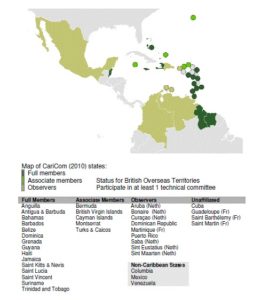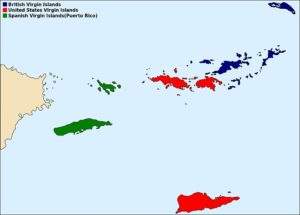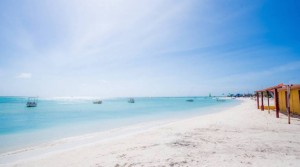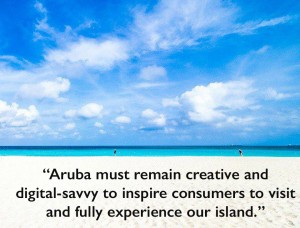Go Lean Commentary
There continues to be a Long Train of Abuses in the Caribbean countries. There are 30 member-states – all with European legacies – some independent countries and some dependent territories, but the assessment is the same:
We have many societal defects; we do not always treat our neighbors as neighborly as we should; at times we have been toxic and hostile towards certain minority groups and we have chased many people away, causing them to flee for refuge abroad.
We need to reform and transform Human Rights protections in our homeland. If only we can be more like the countries our emigrants seek refuge in! Destinations like the US, Canada, the United Kingdom and the European Union. If only we can be more liberal – live and let live – compared to our conservative or intolerant nature. Why the difference?
The European Union (EU), in its short history, has been very good for regulating Human Rights through out the EU member-states and the whole world for that matter. In fact, after the actuality of World War I and World War II being fought within Europe and by opposing European factions, the EU was recognized as the new dampening force that held the 27 member-states together in peaceful harmony. For this grandiose accomplishment, they were awarded the 2012 Nobel Peace Prize. The 2013 book Go Lean … Caribbean relates (Page 130):
Nobel Peace Prize
The 2012 Nobel Peace Prize was awarded to the EU “for over six decades having contributed to the advancement of peace and reconciliation, democracy and human rights in Europe” by unanimous decision of the committee in Norway.
That page in the book goes on to relate another benefit of the EU, the day-to-day enforcement of Human Rights:
Human Rights Declaration
Values like human dignity, freedom, democracy, equality, and the rule of law and respect for human rights have been embedded in the EU treaties right from the start.
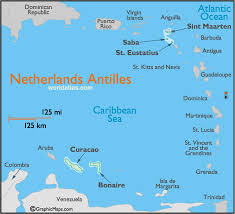 There are Caribbean territories that are actually members of the European Union … kinda. That would be the French Antillean islands (Guadeloupe, Martinique, St. Bartholomew and St. Martin) and the Netherlands Antilles (Aruba, Bonaire, Curaçao, Saba, Sint Eustatius, and Sint Maarten). The Netherlands Antilles have gone through some upheavals, with integration and secession events. At this moment, the 6 islands have the status of either constituent states within the Kingdom of the Netherlands or direct parts of the Netherlands proper, governed by the capitol in Amsterdam as “special municipalities”. At this juncture the Netherlands Antilles have this status in the EU, according to Wikipedia:
There are Caribbean territories that are actually members of the European Union … kinda. That would be the French Antillean islands (Guadeloupe, Martinique, St. Bartholomew and St. Martin) and the Netherlands Antilles (Aruba, Bonaire, Curaçao, Saba, Sint Eustatius, and Sint Maarten). The Netherlands Antilles have gone through some upheavals, with integration and secession events. At this moment, the 6 islands have the status of either constituent states within the Kingdom of the Netherlands or direct parts of the Netherlands proper, governed by the capitol in Amsterdam as “special municipalities”. At this juncture the Netherlands Antilles have this status in the EU, according to Wikipedia:
Status in the European Union
The Kingdom of the Netherlands is a member of the European Union. However, Aruba, Curaçao, and Sint Maarten have the status of overseas countries and territories (OCTs) and are not part of the EU. Nevertheless, only one type of citizenship exists within the Kingdom (Dutch), and all Dutch citizens are EU citizens (including those in the OCTs).
All of this history helps to explain why there is a difference in the European Netherlands versus the Caribbean ( Antillean) Netherlands. Why the difference?
For one, religiosity is a driving force for the Community Ethos of Caribbean society. “Community Ethos”, that is defined as a noun, as:
- the fundamental character or spirit of a culture; the underlying sentiment that informs the beliefs, customs, or practices of a group or society; dominant assumptions of a people or period.
- the character or disposition of a community, group, person, etc.
This is a continuation of the monthly Teaching Series from the movement behind the Go Lean book on the Long Train of Abuses that have molded our people and our society. We do indeed have societal defects that were embedded in our colonial past but didn’t evolve as our Host Colonizers (i.e. The Netherlands, Holland or Amsterdam) evolved. We are stuck in time …
We are partying like its 1869 …
Remember the bad religious orthodoxy that was discussed in the previous entries in this blog series; how these “hatreds” were embedded in national edicts (Law-and-Order) over the centuries: Slavery, Colonialism , Patriarchy / Gender Rights, White Supremacy, Buggery / LGBT Rights, Child Abuse.
This monthly Go Lean Teaching Series always presents issues that are germane to Caribbean life and culture and how to address them. For this month of December 2020, we are looking at the Long Train of Abuses that have pushed our people away from the homeland. This is entry 5-of-6; which illustrates that embedded intolerance in Caribbean society has had the bad consequences of chasing good people away from the Antillean Netherlands to go to the European Netherlands. This is the “Dutch” all around; yet the clear assessment of toxicity and dysfunction in the tropical islands is a clear contrast to the progressive liberalism in the European homeland. We feature a Long Train of Abuses that we have to endure, while Amsterdam features a laissez-faire attitude that has been more inviting and appealing.
The full catalog of the series this month is as follows:
- Long Train of Abuses: Enough Already – Colonialism Be Gone!
- Long Train of Abuses: Overseas Masters – Cannot See Overseas
- Long Train of Abuses: Religious Leadership in Politics – Reconciling Trump
- Long Train of Abuses: Religious Character in Society – Human Rights
- Long Train of Abuses: Dutch Hypocrisy – Liberal Amsterdam vs Conservative Antilles
- Long Train of Abuses: Puerto Rico – “Take the Heat” or “Get out of the Kitchen”
The Netherlands Antilles is in crisis; they continue to suffer from a Long Train of Abuses … they cannot hold on to their young people or any of their highly educated citizens – Brain Drain. People are fleeing to … the European Netherlands – rated as one of the best places to live, work and play.
See this previous Go Lean commentary on Aruba, the biggest Dutch Caribbean community. Consider this excerpt:
The State of Aruba’s Economy – February 19, 2015
The largest of the Dutch Caribbean is Aruba.
Aruba called for secession from the Netherlands Antilles from as early as the 1930s, becoming a separate state within the Kingdom of the Netherlands in 1986. After many other organizational developments, by 2010, Aruba is dispositioned as one of the four constituent countries that form the Kingdom of the Netherlands, along with the Netherlands (European homeland), Curaçao and Sint Maarten.
What is the status of Aruba today?
How has it fared as an autonomous state?
The Go Lean book posits that Aruba is in crisis; (along with the rest of the Caribbean). This is also the assessment by the International Monetary Fund, as related in this news article:
By: The Caribbean Journal staff
Aruba’s economy is “recovering gradually” from a “severe double-dip recession,” according to the International Monetary Fund, which recently concluded its 2015 Article IV Mission to the Dutch Caribbean island.
The recession was [exacerbated] by a pair of factors: the global financial crisis and the shutdown of the oil refinery in Aruba. …
Aruba fails to keep its young people at home. In fact, the anecdotal experience (one story after another) is that young people abandon this island as soon as they finish high school; many never to return again, except for occasional visits. (Aruban natives – plus all Netherland Antilles states – have Dutch citizenship, sharing the same Dutch passport as the Kingdom of the Netherlands).
…
As for the Dutch Caribbean territories, even though they are no longer considered colonies, but rather constituent countries of the Kingdom of the Netherlands, they are effectively just welfare states dependent on Amsterdam; and a feeder for low-cost labor in Holland. They are inconsequential within the Dutch sphere of influence. There are parasites not protégés!We must do better!
On the other hand, there is Amsterdam, the capital and principal city for the Kingdom of the Netherlands; see Appendices.
Amsterdam is the capital and most populous city of the Netherlands with a population of 872,680[12] within the city proper, 1,558,755 in the urban area[5] and 2,480,394 in the metropolitan area.[9] Found within the province of North Holland,[13][14] Amsterdam is colloquially referred to as the “Venice of the North“, attributed by the large number of canals which form a UNESCO World Heritage Site.
Amsterdam was founded at the Amstel, that was dammed to control flooding, and the city’s name derives from the Amstel dam.[15] Originating as a small fishing village in the late 12th century, Amsterdam became one of the most important ports in the world during the Dutch Golden Age of the 17th century, and became the leading centre for finance and trade.[16] In the 19th and 20th centuries, the city expanded and many new neighbourhoods and suburbs were planned and built.
Amsterdam’s main attractions include its historic canals, the Rijksmuseum, the Van Gogh Museum, the Stedelijk Museum, Hermitage Amsterdam, the Concertgebouw, the Anne Frank House, the Scheepvaartmuseum, the Amsterdam Museum, the Heineken Experience, the Royal Palace of Amsterdam, Natura Artis Magistra, Hortus Botanicus Amsterdam, NEMO, the red-light district and many cannabis coffee shops. It drew more than 5 million international visitors in 2014.[17] The city is also well known for its nightlife and festival activity; with several of its nightclubs (Melkweg, Paradiso) among the world’s most famous. Primarily known for its artistic heritage, elaborate canal system and narrow houses with gabled façades; well-preserved legacies of the city’s 17th-century Golden Age. These characteristics are arguably responsible for attracting millions of Amsterdam’s visitors annually. Cycling is key to the city’s character, and there are numerous bike paths.
The Amsterdam Stock Exchange is considered the oldest “modern” securities market stock exchange in the world. As the commercial capital of the Netherlands and one of the top financial centres in Europe, Amsterdam is considered an alpha world city by the Globalization and World Cities (GaWC) study group. The city is also the cultural capital of the Netherlands.[18] Many large Dutch institutions have their headquarters in the city, including: the Philips conglomerate, AkzoNobel, Booking.com, TomTom, and ING.[19] Moreover, many of the world’s largest companies are based in Amsterdam or have established their European headquarters in the city, such as leading technology companies Uber, Netflix and Tesla.[20] In 2012, Amsterdam was ranked the second best city to live in by the Economist Intelligence Unit (EIU)[21] and 12th globally on quality of living for environment and infrastructure by Mercer.[22] The city was ranked 4th place globally as top tech hub in the Savills Tech Cities 2019 report (2nd in Europe),[23] and 3rd in innovation by Australian innovation agency 2thinknow in their Innovation Cities Index 2009.[24] The Port of Amsterdam is the fifth largest in Europe.[25] The KLM hub and Amsterdam’s main airport: Schiphol, is the Netherlands’ busiest airport as well as the third busiest in Europe and 11th busiest airport in the world.[26] The Dutch capital is considered one of the most multicultural cities in the world, with at least 177 nationalities represented.[27]
…
Diversity and immigration
Amsterdam experienced an influx of religions and cultures after the Second World War. With 180 different nationalities,[138] Amsterdam is home to one of the widest varieties of nationalities of any city in the world.[139] The proportion of the population of immigrant origin in the city proper is about 50%[140] and 88% of the population are Dutch citizens.[141]Amsterdam has been one of the municipalities in the Netherlands which provided immigrants with extensive and free Dutch-language courses, which have benefited many immigrants.[142]
Economy – Tourism
Amsterdam is one of the most popular tourist destinations in Europe, receiving more than 5.34 million international visitors annually, this is excluding the 16 million day-trippers visiting the city every year.[171] The number of visitors has been growing steadily over the past decade. This can be attributed to an increasing number of European visitors. Two-thirds of the hotels are located in the city’s centre.[172] Hotels with 4 or 5 stars contribute 42% of the total beds available and 41% of the overnight stays in Amsterdam. The room occupation rate was 85% in 2017, up from 78% in 2006.[173][174] The majority of tourists (74%) originate from Europe. The largest group of non-European visitors come from the United States, accounting for 14% of the total.[174] Certain years have a theme in Amsterdam to attract extra tourists.
…
Source: Retrieved December 12, 2020 from: https://en.wikipedia.org/wiki/Amsterdam
Why such a sharp difference between the actuality of Aruba and that of Amsterdam?
- Aruba appears in crisis; Amsterdam is thriving – one of the best cities in the world.
- People cannot wait to get out of one, while people are striving (lining up, begging & petitioning) to get in to the other.
So exactly what is the difference? Heart.
The Go Lean book associates the “heart” with Community Ethos, defined above. The fact is that no one, individual or community can forge change without first changing the hear of community ethos. This was vividly explained in the same Page 10 of the Go Lean book. See this excerpt:
Change is not easy …
Just ask anyone attempting to quit smoking. Not only are there physiological challenges, but psychological ones as well, to the extent that it can be stated with no uncertainty that “change begins in the head”. In psycho-therapy the approach to forge change for an individual is defined as “starting in the head (thoughts, visions), penetrating the heart (feelings, motivations) and then finally manifesting in the hands (actions). This same body analogy is what is purported in this book for how the Caribbean is to embrace change – following this systematic flow:
- Head Plans, models and constitutions
- Heart Community Ethos
- Hands Actions, Reboots, and Turn-arounds
What is the community ethos of Amsterdam … that allows them to strive despite internal and external challenges?
- Liberalism –
a political and moral philosophy based on liberty, consent of the governed and equality before the law.[1][2][3] Liberals espouse a wide array of views depending on their understanding of these principles, but they generally support free markets, free trade, limited government, individual rights (including civil rights and human rights), capitalism, democracy, secularism, gender equality, racial equality, internationalism, freedom of speech, freedom of the press and freedom of religion.[4][5][6][7][8][9][10]
Liberalism in the Netherlands started as an anti-monarchical effort spearheaded by the Dutch statesman Thorbecke, who almost single-handedly wrote the 1848 Constitution of the Netherlands that turned the country into a constitutional monarchy.
In contemporary politics, there are both left and right-wing parties that refer to themselves as “liberal“, with the former more often espousing social liberalism and the latter more often espousing classical liberalism. A common characteristic of these parties that they are nominally irreligious, in contrast to the traditionally dominant and still popular Christian democracy.[1]
That is it!
Liberalism or “live and let live”. (Note: This commentary is not advocating for free-for-all sex or drugs).
Amsterdam is known for its liberal views toward social issues (recreational drugs, prostitution, same-sex marriage and euthanasia) while the Caribbean member-states are known for its dogmatic, judgmental and intolerant society. Yet we wonder why people are fleeing one place and seeking refuge in the other. There is no need to wonder.
Notice that one of the attributes of Amsterdam liberalism is their tendency towards being irreligious. That refers to:
Considering the full theme of this blog-commentary series, we see that religious indifference is the challenge. It was religious expansion – Christianity Christendom – that motivated the exploration, conquest and colonization of the New World, and apparently that initial indoctrination never subsided. That Christian Community Ethos that was embedded then was dogmatic, judgmental and intolerant, thusly uninviting, where as the irreligious attribute was/is indifference.
So we ask these questions to those of you in the Netherlands Antilles, and by extension, to all of the Caribbean:
- What do you want to be when you grow up?
- Do you want to be successful and progressive and prosperous like Amsterdam?
- Do you want to compete with Amsterdam to provide those with a choice the option to prosper here where they are planted?
- Or do you want to continue with the status quo and continue to watch the decline in your society?
To even approach the position of answering these questions, our Caribbean member-states must be prepared to work together – in a more perfect union – to foster a better homeland. We must serve and protect. Human Rights should only be the floor; we must be prepared to build upon a strong foundation and reach great heights. Reform and transform …

We have addressed this theme before.
This Go Lean movement has previously detailed many related issues and advocacies for reforming and transforming the Caribbean member-states; consider this sample of previous blog-commentaries:
| https://goleancaribbean.com/blog/?p=20573 | Remembering and Remediating Our History – The Need to Reform |
| https://goleancaribbean.com/blog/?p=20567 | Transforming our Toxic Environments to Make the Caribbean Great |
| https://goleancaribbean.com/blog/?p=20561 | Embracing ‘Diversity & Inclusion’ |
| https://goleancaribbean.com/blog/?p=20292 | Advocating for Empathy – How? Conscientizing on VIDEO |
| https://goleancaribbean.com/blog/?p=20072 | Rise from the Ashes – We now know Liberalism is Better than Fascism |
| https://goleancaribbean.com/blog/?p=19833 | The Need to Reform – Hypocrisy cancels out Law-and-Order |
| https://goleancaribbean.com/blog/?p=19572 | Master Class – How to reform and transform the Economy & Society |
| https://goleancaribbean.com/blog/?p=19051 | Forging Change – By Building Momentum |
| https://goleancaribbean.com/blog/?p=11224 | ‘Loose Lips Sink Ships’ – Fanatical Theologians Undermine Progress |
| https://goleancaribbean.com/blog/?p=10513 | Transforming ‘Money’ Countrywide – A Model for the new Caribbean |
| https://goleancaribbean.com/blog/?p=7991 | Transformations: Caribbean Postal Union – Delivering the Future |
| https://goleancaribbean.com/blog/?p=5695 | Reforming, Repenting, Forgiving and Reconciling the Past |
If we know where the destination is and we have the urgent need to get there, why wait and waste time proceeding there?
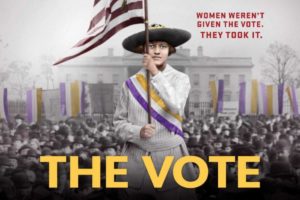 The European Netherlands have always been ahead of us in the Caribbean, but eventually everyone else catches up. Consider the example of universal suffrage: One Man / One Woman / One Vote.
The European Netherlands have always been ahead of us in the Caribbean, but eventually everyone else catches up. Consider the example of universal suffrage: One Man / One Woman / One Vote.
The US reached that destination in 1920 (with racial caveats that weren’t corrected until the Voting Rights Act of 1964):
- The British granted that right in 1918.
- Many Caribbean member-states waited and wasted valuable time, capital and people and didn’t reach the same destination until 1961.
- When did the Netherlands grant this right? 1919; yet they did not allow the same right to their Caribbean colonies until 1949.
Surely, we do not still wonder why the Caribbean territories of the Netherlands – and other colonial legacies – linger influx when it comes to progress and development compared to their First World counterparts?
The Long Train of Abuses ... continues to ride.
Why wait and endure more unnecessary misery? The answer is a progressive liberalism that the European colonial host already enjoy – live and let live; think Amsterdam. This goal is within view; we should reach out and grab it. The Bible provides the guidance to:
9 Strip off the old personalityb with its practices, 10 and clothe yourselves with the new personalityc , which through* accurate knowledge is being made new according to the image of the One who created it.- Colossians 3:9, 10 NWT
We know what the “garment of truth” looks like.
We hereby urge all stakeholders – in the Caribbean and the Diaspora or decision-makers in the Host Countries – to lean-in to this Way Forward for societal progress in the Caribbean; this is the quest of the Go Lean roadmap. This is our plan to make our regional homeland a better place to live, work and play. 🙂
About the Book
The book Go Lean…Caribbean serves as a roadmap for the introduction and implementation of the technocratic Caribbean Union Trade Federation (CU), for the elevation of Caribbean society – for all member-states. This CU/Go Lean roadmap has these 3 prime directives:
- Optimization of the economic engines in order to grow the regional economy to $800 Billion & create 2.2 million new jobs.
- Establishment of a security apparatus to ensure public safety and protect the resultant economic engines.
- Improve Caribbean governance to support these engines, including a separation-of-powers between the member-states and CU federal agencies.
The Go Lean book provides 370-pages of turn-by-turn instructions on “how” to adopt new community ethos, plus the strategies, tactics, implementations and advocacies to execute so as to reboot, reform and transform the societal engines of Caribbean society.
Download the free e-Book of Go Lean … Caribbean – now!
Who We Are
The movement behind the Go Lean book – a non-partisan, apolitical, religiously-neutral Community Development Foundation chartered for the purpose of empowering and re-booting economic engines – stresses that reforming and transforming the Caribbean societal engines must be a regional pursuit. This was an early motivation for the roadmap, as pronounced in the opening Declaration of Interdependence (Pages 12 – 13):
x. Whereas we are surrounded and allied to nations of larger proportions in land mass, populations, and treasuries, elements in their societies may have ill-intent in their pursuits, at the expense of the safety and security of our citizens. We must therefore appoint “new guards” to ensure our public safety and threats against our society, both domestic and foreign. The Federation must employ the latest advances and best practices … to assuage continuous threats against public safety.
xi. Whereas all men are entitled to the benefits of good governance in a free society, “new guards” must be enacted to dissuade the emergence of incompetence, corruption, nepotism and cronyism at the peril of the people’s best interest. The Federation must guarantee the executions of a social contract between government and the governed.
xxiv. Whereas a free market economy can be induced and spurred for continuous progress, the Federation must install the controls to better manage aspects of the economy: jobs, inflation, savings rate, investments and other economic principles. Thereby attracting direct foreign investment because of the stability and vibrancy of our economy.
Sign the petition to lean-in for this roadmap for the Caribbean Union Trade Federation.
————————–
Appendix A VIDEO – What’s the deal with Amsterdam’s “liberal culture”? – https://vimeo.com/189429665
What’s the deal with Amsterdam’s “liberal culture”? from Eric Maddox on Vimeo.
Posted October 29, 2016 – In September 2016 students in Amsterdam and Beirut shared a Virtual Dinner together, discussed politics, the refugee crisis, Amsterdam’s reputation as a live-and-let-live city, and the delicate coexistence of different groups and ideologies in Lebanon. At the end of the discussion each group asked their partners on the other end of the virtual table a question to take to the streets of their communities an pose to everyday people.
This film presents the results of the Amsterdam team’s effort to address the question given to them from Lebanon. It is the 3rd of the three short films (2 from Lebanon and one from Amsterdam) completed by our teams in both countries. The project was sponsored by The Embassy of The Netherlands in Lebanon, and completed in collaboration with Unite Lebanon Youth Project.
This film focusses on Amsterdam. Our co-participants in The Netherlands walked around the city asking people of all backgrounds, a question that had been given to us by our co-participants in Lebanon:
“What does Amsterdam’s liberal culture mean to you?”
The Virtual Dinner Guest Project is a production of Open Roads Media, an Amsterdam based nonprofit with a global focus on putting the media narrative in the hands of the people and transforming conflict through direct engagement and creative collaboration that educates a global audience:
You can also follow our progress and our snapshots, for this and previous projects, on social media:
Facebook: Open Roads Media
Twitter: @VirtualDinner
Instagram: Virtual Dinner
————————–
Appendix B VIDEO – Amsterdam, the Liberal City – https://youtu.be/R5mFxBkMorQ
Club Travel
Posted May 16, 2013 – Book an amazing city break to Amsterdam, Club Travel offers its customers the best prices on cheap City-Break packages, cheap flights, hotels and holidays to Amsterdam and many other great cities in Europe. Book today at our website:
http://www.clubtravel.ie/city-breaks/…
http://www.clubtravel.ie/city-breaks/…
http://www.clubtravel.ie presents: Amsterdam!
Amsterdam is famous for plenty of reasons, and while not all of them appeal to everybody, travellers of all types are guaranteed to find what they are searching for in this lively and vigorous town. Whether you’re interested in culture and in search of some great museums and idyllic old roads, a party animal looking for some nights of excess and indulgence; or somewhere in between, and just seeking a fantastic site to take in some Grolsch beers and a bit of discovering, Amsterdam is an exciting city.
Club Travel — Irish travel agents specialising in holidays, city breaks and cheap flights to Amsterdam. Follow us on Facebook, Twitter and Google+ for competitions, updates and last minute flight and holiday deals to Amsterdam.
Information: http://www.clubtravel.ie/flights/chea…
http://www.clubtravel.ie/cheap-sun-ho…
Facebook: https://www.facebook.com/clubtravel.ie
Twitter: https://twitter.com/clubtravelie
==================================
See related VIDEO: https://youtu.be/Ufm1GP77bL4

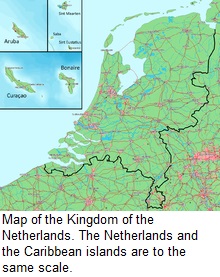
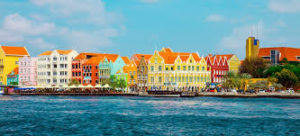


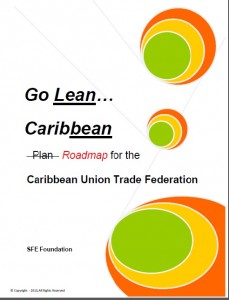
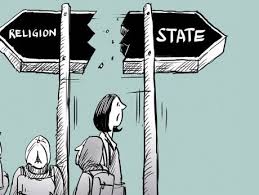
 What is the weather right now in Amsterdam, London, Paris and/or Washington DC?
What is the weather right now in Amsterdam, London, Paris and/or Washington DC?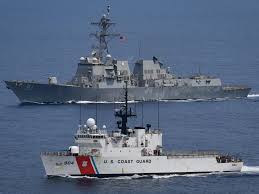
 “They never told us it was dangerous,” Ambroise Bertin says. “So people were working, because they wanted the money. We didn’t have any instructions about what was, and wasn’t, good. That’s why a lot of people are poisoned.” He’s talking about chlordecone, a chemical in the form of a white powder that plantation workers were told to put under banana trees, to protect them from insects.
“They never told us it was dangerous,” Ambroise Bertin says. “So people were working, because they wanted the money. We didn’t have any instructions about what was, and wasn’t, good. That’s why a lot of people are poisoned.” He’s talking about chlordecone, a chemical in the form of a white powder that plantation workers were told to put under banana trees, to protect them from insects.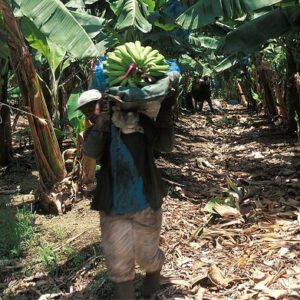 “They used to tell us: don’t eat or drink anything while you’re putting it down,” Ambroise, now 70, remembers. But that’s the only clue he and other workers in Martinique’s banana plantations in the 1970s, 80s and early 90s had about the possible danger. Few if any were told to wear gloves or masks. Now, many have suffered cancer and other illnesses.
“They used to tell us: don’t eat or drink anything while you’re putting it down,” Ambroise, now 70, remembers. But that’s the only clue he and other workers in Martinique’s banana plantations in the 1970s, 80s and early 90s had about the possible danger. Few if any were told to wear gloves or masks. Now, many have suffered cancer and other illnesses.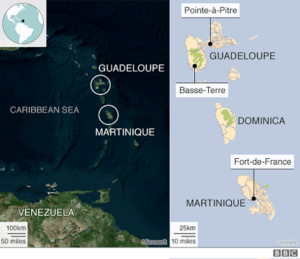
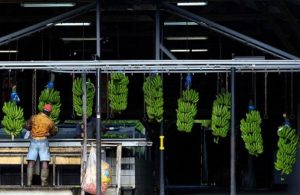 “Those are still the same group of people who have uncontested domination of the land,” says Guilaine Sabine, activist in a grassroots organisation called Zero Chlordecone Zero Poison. As well as campaigning for free blood tests for everyone on the island, members of the group have taken part in a new wave of protests over the last year aiming to draw attention to businesses that activists say have profited from the production and use of toxic pesticides. The demonstrations have been small, and some protesters have been convicted of violence against the police. But they reflect wider anger over the slow pace of France’s response to the chlordecone catastrophe.
“Those are still the same group of people who have uncontested domination of the land,” says Guilaine Sabine, activist in a grassroots organisation called Zero Chlordecone Zero Poison. As well as campaigning for free blood tests for everyone on the island, members of the group have taken part in a new wave of protests over the last year aiming to draw attention to businesses that activists say have profited from the production and use of toxic pesticides. The demonstrations have been small, and some protesters have been convicted of violence against the police. But they reflect wider anger over the slow pace of France’s response to the chlordecone catastrophe.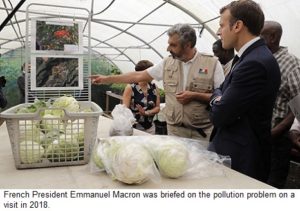

 Notwithstanding indigenous Amerindian cultures, the Caribbean represents the oldest civilizations in the New World. Columbus made his New World discovery here in the Caribbean:
Notwithstanding indigenous Amerindian cultures, the Caribbean represents the oldest civilizations in the New World. Columbus made his New World discovery here in the Caribbean: